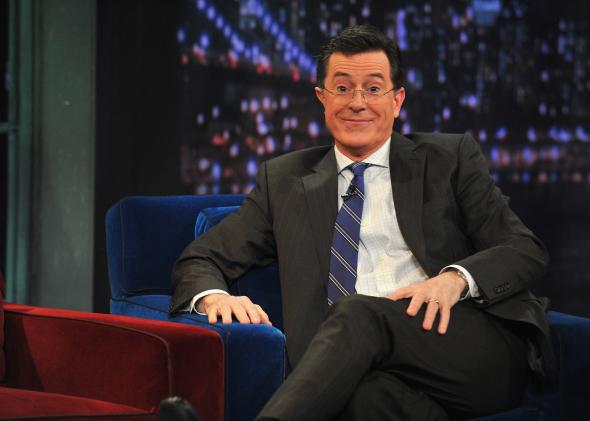Just days after David Letterman announced his retirement, CBS moved with uncharacteristic speed and named Stephen Colbert—who has reportedly been syncing his own contract up with Letterman’s for exactly this eventuality—his replacement. When Colbert makes the leap to The Late Show in 2015, he will not be taking his famous, stupid-like-a-fox conservative persona with him. (It remains to be seen if he will be able to jettison the silent T as easily.) Colbert is a huge talent. To do what he has done at The Colbert Report is the equivalent, to paraphrase a remark about Ginger Rogers, of hosting a show every night, backward and in heels. His wit, speed, charm, mischievousness, ear for hypocrisy, and ridiculousness are now free to operate without constraints—and the constraint I’m most glad he is free of is the one of persona.
This has been a tumultuous time for late night: Leno just left to be replaced by Jimmy Fallon who was in turn replaced by Seth Meyers. ABC got serious about Jimmy Kimmel, and bumped him up a time slot. And not that long ago, Conan O’Brien moved to a whole new network. And yet through all this change, late-night network TV has remained remarkably static. None of the white men with their names in the title have seriously altered the monologue-desk-interview format. If this standard mode is not abjectly broken and that’s why no one has attempted to fix it, it has not exactly been humming along, either: The networks continue to lose viewers to more niche, more creatively formatted late-night shows, The Colbert Report among them.
But Colbert is in a unique position to do something about all this sameness. He, unlike almost all the aforementioned gentleman, is starting in one essential way from scratch: Audiences don’t exactly know him. Stephen Colbert, the man, has had a long career doing things other than playing Stephen Colbert, the blowhard— you can see clips of him out of character here—but America is not particularly familiar with that first guy. The Late Show with Stephen Colbert will be, by necessity, a whole-scale re-imagining of someone we thought we knew. Hopefully this fresh start will extend beyond Colbert to the structure of his late night show itself.
If Colbert can bring his ire and pointed wit to bear on the format—turn the monologue into more of an argument or op-ed than a string of lame jokes; invite authors, scientists, politicians, and intellectuals to join him after the celebrities—that will be a boon to himself, CBS, audiences, and the genre. The other possibility—that he becomes another talent stuck behind a stifling desk—is almost too awful to bear. May we not see one of the greatest performers of our generation destroyed by interviewing Bradley Cooper about The Hangover 5.
I am very optimistic, however, that such a tragedy will not come to pass. The Colbert Report airs a not particularly spectacular episode from time to time, but it is bracingly good with a consistency unmatched by any other show on late night. This is a grinding medium in which being regularly decent enough to fall asleep to is a high hurdle to clear. The format of The Colbert Report—the dynamite character at its center and the insane and inane politics it gets to skewer—gives it a boost, but, obviously, huge credit for its quality goes to the energy of Colbert and his writing staff, who—like their occasionally wild-eyed creation—feel uniquely, notably unflagging. Forget whether Colbert is worthy of late night: To make late night worthy of Colbert’s talents is going to take someone exactly as determined, amped up, and passionate as Stephen Colbert—and remember, we’re hitting the T now.
